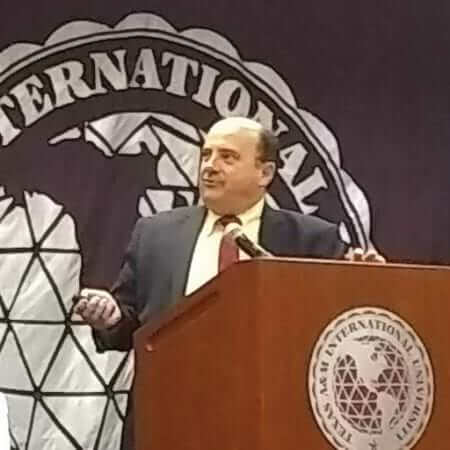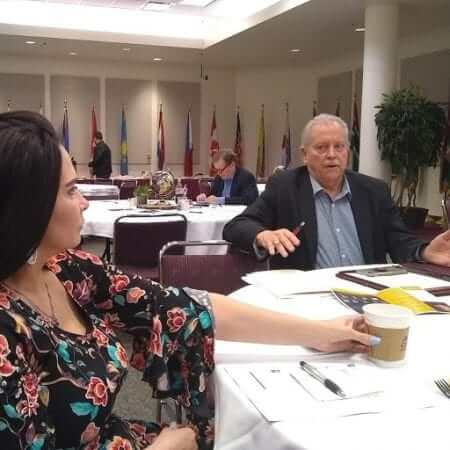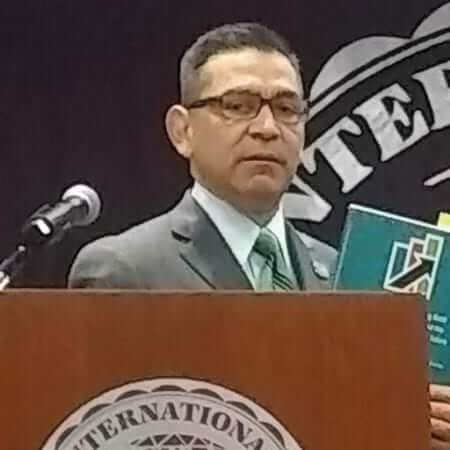
This past Jan. 10-11, the Future of the Region Conference took place at Texas A&M International University (TAMIU) in Laredo. The conference has been held every two years since 1993 as a way for stakeholders in South Texas to meet and discuss issues and concerns that cut across the 47-county region. Previous conferences addressed a wide range of issues such as workforce development, investment, economic development, healthcare, education and infrastructure services.
 TAMIU President Dr. Pablo Arenaz, Laredo Mayor Pete Saenz and Future of the Region South Texas President Kym Bolado kicked things off with opening remarks. Other speakers included Live Oak County Judge Jim Huff, Dr. Federico Schaffler Gonzales with the TAMIU Texas Center, and John LaRue, recently retired executive director of the Port of Corpus Christi. Conference keynote speaker was Julian Alvarez III, the commissioner representing labor on the Texas Workforce Commission.
TAMIU President Dr. Pablo Arenaz, Laredo Mayor Pete Saenz and Future of the Region South Texas President Kym Bolado kicked things off with opening remarks. Other speakers included Live Oak County Judge Jim Huff, Dr. Federico Schaffler Gonzales with the TAMIU Texas Center, and John LaRue, recently retired executive director of the Port of Corpus Christi. Conference keynote speaker was Julian Alvarez III, the commissioner representing labor on the Texas Workforce Commission.
As the South Texas region continues to develop, initiatives to support long-term planning and coalition building will remain essential. Activity in the Eagle Ford Shale, for example, challenges communities to address traffic safety, infrastructure upgrades, housing, workforce development, healthcare, education and attraction of new investment. The energy industry continues to play an important role in the region, even as the boom-bust cycle forced companies to readjust to fluctuating oil prices.
 Dr. Schaffler explored border issues based on a recent survey administered by the TAMIU Texas Center. In contrast with the recent focus on a border wall, survey responses indicated that policymakers should perhaps instead focus on bi-national collaboration, quality of life, and institutional capabilities, as well as recognizing the critical interdependency with Mexican counterparts. Such an approach will require individual cities, counties and councils of governments to work across regions in order to gain traction along the nearly 2,000-mile border with Mexico.
Dr. Schaffler explored border issues based on a recent survey administered by the TAMIU Texas Center. In contrast with the recent focus on a border wall, survey responses indicated that policymakers should perhaps instead focus on bi-national collaboration, quality of life, and institutional capabilities, as well as recognizing the critical interdependency with Mexican counterparts. Such an approach will require individual cities, counties and councils of governments to work across regions in order to gain traction along the nearly 2,000-mile border with Mexico.
 Other key issues included discussions surrounding the urban-rural divide. Until the last few decades, Texas was a largely rural state. However, with the mechanization of agriculture, most of the population growth now occurs in the large metro areas: Dallas-Fort Worth, Houston, San Antonio and Austin. By contrast, most rural communities have either experienced modest population growth or outright decreases. This trend affects representation and, correspondingly, political clout in the state Legislature. As urban populations increase, so does their share of both state Senate and House seats. Rural communities in Texas will be challenged to find ways to make their voices heard as this imbalance likely grows in coming years.
Other key issues included discussions surrounding the urban-rural divide. Until the last few decades, Texas was a largely rural state. However, with the mechanization of agriculture, most of the population growth now occurs in the large metro areas: Dallas-Fort Worth, Houston, San Antonio and Austin. By contrast, most rural communities have either experienced modest population growth or outright decreases. This trend affects representation and, correspondingly, political clout in the state Legislature. As urban populations increase, so does their share of both state Senate and House seats. Rural communities in Texas will be challenged to find ways to make their voices heard as this imbalance likely grows in coming years.

In a recent white paper, a group of local academics and other area stakeholders examined educational inequality in Texas. Currently, new or expanding businesses in the state enjoy the ability to import talent from other regions or countries. Long-term, however, this will not be a viable strategy for Texas. Public policy should ensure that all children in Texas receive a quality education, regardless of where they live.
Finally, with the recent government shutdown, South Texas now figures prominently in the public spotlight. Coincidentally, the Future of the Region Conference unexpectedly occurred at the same time as the president’s recent impromptu visit to McAllen. With any luck, policymakers will also consider approaches such as those proposed in Laredo to support sound community and economic development along the southern border of Texas.
About the author: Thomas Tunstall, Ph.D., is the Senior Research Director at the University of Texas at San Antonio’s Institute for Economic Development, and was a principal investigator for numerous economic and community development studies. He has published peer-reviewed articles on shale oil and gas, and has written op-ed articles on the topic for the Wall Street Journal. Dr. Tunstall holds a doctorate degree in political economy, a master’s in business administration from The University of Texas at Dallas, and a bachelor of business administration from The University of Texas at Austin.














